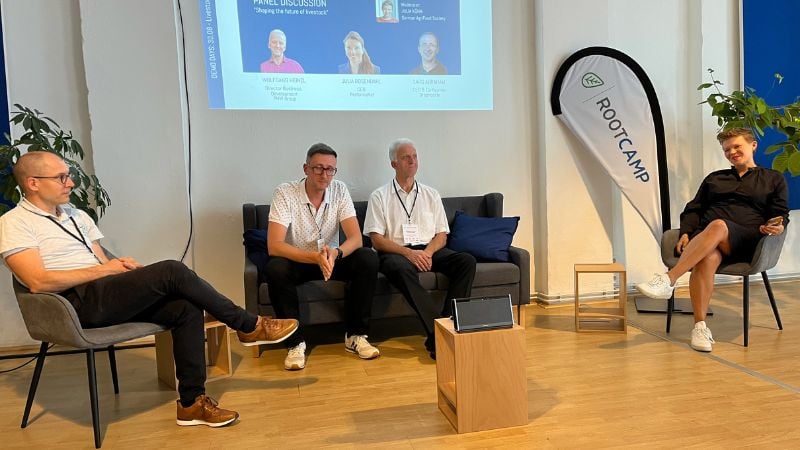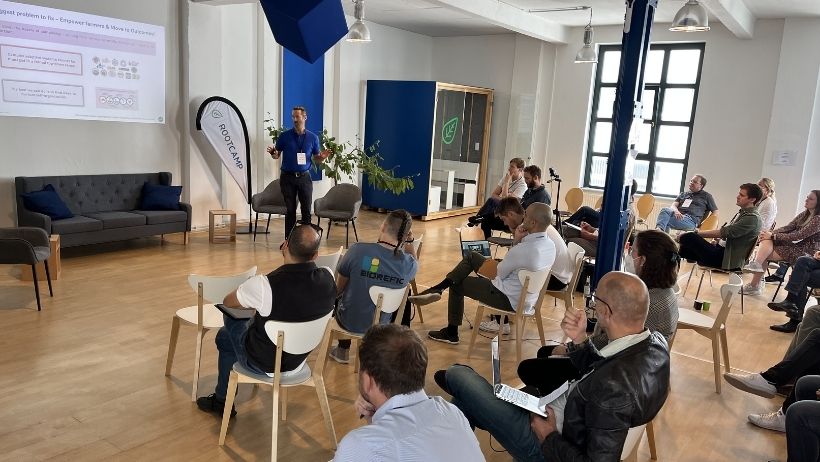After almost two long years of digital batches and events, Batch #3 ended with not only one but even two in-person Demo Days in a row! Startups, corporates, investors and other experts gathered on the 30th and 31st of August at the RootCamp headquarters in Hanover. This article gives you a deep dive into carbon farming.
Carbon farming: Pushed by the European Union to tackle climate change
Carbon farming means a long-term increase in soil organic carbon. It has a large potential to tackle climate change. The FAO estimates the global soil organic carbon sequestration potential could mitigate yearly agricultural greenhouse gas emissions by 8.6 % to 33 %. That’s why the topic gains more and more attention in recent years and is pushed by the European Union to tackle climate change. The plans sound promising, but there are still many open points: not only on the technological side, speaking especially about the accuracy of measuring soil organic carbon, but also regarding the broad topic of measurement, reporting and verification.
Showcase time for RootCamp’s carbon farming startups
/RootCamp%20Demo%20Day%20Carbon%20Farming%202022.jpg?width=820&name=RootCamp%20Demo%20Day%20Carbon%20Farming%202022.jpg)
Startups, corporates, investors and other experts gathered the Demo Days on the 30th and 31st of August at the RootCamp headquarters in Hanover.
Among interesting keynotes and panels, the stage belonged to the RootCamp startups from Batch #2 and #3 with a focus on carbon farming technologies. The following startups had the opportunity to pitch their approach to fostering the carbon farming community in front of the audience:
Seqana
Seqana from Germany offers a modest first contribution to make Earth Observation data more accessible to end-users, particularly for project developers of Nature-Climate Solutions (NCS). The app aims to provide NCS-project developers a way to test the applicability and feasibility of remote sensing data for existing Monitoring, Reporting and Verification and get real insights into carbon sequestration around the world.
AgriCircle
AgriCircle based in Switzerland is a leading provider of technologies for a more productive and sustainable agriculture. The startup makes sustainable food production measurable and together with farmers and food processors, they fight for more soil vitality, biodiversity and more efficient and sustainable use of resources in agriculture.Climate Farmers
Climate Farmers with seat in Germany enables an effective carbon market for agriculture through the development of soil carbon monitoring systems to facilitate farmers' transition to regenerative practices.
GeoPard
GeoPard also from Germany offers a precision agriculture platform which provides insights about any field in the world. Customers of the application take advantage of automatically created multi-year analytics which describes historical and in-season crop development patterns of the field, thereby it helps to know the agricultural area better and to apply the right decision in the right spots at the right time.
Standardization in agtech
Measurement, reporting and verification is a key to boosting carbon farming. That’s why we have been proud to welcome Johannes Lehmann from the German Institute for Standardization (Deutsches Institut für Normung) as keynote speaker. He gave the participants an introduction to the process of standardization in Germany and pointed out that standardization is very important for innovations. Although it sounds like a bureaucratic obstacle, we need standardization to enable collaboration between different players in the field of carbon farming. Our partner K+S initiated a consortium with Klim and rentenbank to work with several other organizations (see picture below) on a DIN SPEC - the small brother of the German norm. Together with Thünen, CO2-Land, LUFA Nord-West (science), WWF, Novihum, DLG, klima humus, BAT Agrar, Food Roots (associations), BayWa, HiPP, AGRAVIS, indigo, BASF, ConstellR (companies) and the Federal Ministry of Food and Agriculture (politics), a DIN SPEC is in development to foster the carbon farming industry in Germany and could be the basis for an European standard in the future.
/Standardization%20in%20agtech%20info%20graphic%20RootCamp%20Demo%20Day.jpg?width=1600&name=Standardization%20in%20agtech%20info%20graphic%20RootCamp%20Demo%20Day.jpg)
(K+S initiated a consortium with Klim and rentenbank to work with several other organizations on a DIN SPEC, Source: Deutsches Institut für Normung)
Unifying and standardizing agriculture practices to measure progress
For the panel discussion about standardizing agriculture practices, we welcomed four experts with different backgrounds:
- Rolf Härdter (from our partner K+S) has a background in plant nutrition, a long history in different departments at K+S and focuses on sustainability within his fields.
- Stephen Schrempp (hydrologist) from CO2-Land, an NGO founded in 2021 to promote local initiatives in carbon farming.
- Ernst Kürsten, project leader at 3N Competence Center for carbon farming with a strong background in forest science.
- Felix Hilti works for Ananda Impact Ventures as an investment manager based in Munich. Ananda is a profit- and impact-driven venture capitalist that invests in scalable startups in the European market to solve environmental and social challenges.
/RootCamp%20Demo%20Day%20Panel%20Carbon%20Farming.jpg?width=820&name=RootCamp%20Demo%20Day%20Panel%20Carbon%20Farming.jpg)
From left to right: Ernst Kürsten, Rolf Härdter, Stephen Schrempp, Felix Hilti and ... (Photo:...)
The consensus of the panelists was quite positive and enthusiastic regarding carbon farming, but all had in mind the big challenges to scale up the concept. One challenge is the transition period for farmers: 1) They often face a yield loss, and 2) the additional revenue stream that is derived from carbon credits doesn’t cover the additional costs. So, farmers are not participating to get additional profits in the short-term, but because they want to be part of the movement to create an impact. All panelists agreed that the farmer should be in the center of the system and receive the main profit that is generated in the value chain. Two of the panelists, Rolf Härdter and Stephen Schrempp, are members of the consortium that is developing the new standard together with the German institute for standardization. Due to the complexity of the regulations in carbon farming, they emphasized the importance of standardization. There are generally two approaches in carbon farming: Action-based rewards and result-based rewards. The former uses the changed agricultural practice and algorithm to estimate the change of carbon in the soil, for example, if a farmer adds cover crops or renounces plowing.
The latter measures, mainly via remote satellite sensing and/or soil samples, directly the carbon sequestered in the soil. Both approaches are quite complex with many variables. That is why standardization is required and at the same time, the standard have to be flexible. It needs to grow and change with the carbon farming industry. Investment manager Felix Hilti added: “There is a huge amount of venture capital available for startups working on climate solutions. But for carbon farming startups - although the potential to mitigate climate change is enormous - the amount of money invested is still relatively low.”
What’s next in the innovation hub?
The Demo Days of Batch #3 were a success, and we brought together many different stakeholders. We are looking forward to our next big events. Meanwhile, you can meet the RootCamp team at EuroTier, the leading international trade fair for professional animal farming and livestock management in Hanover between the 15th and 18th of November 2022. If you are an agtech startup wants to be part of the next demo day, then you should apply for our Batch #4 accelerator program until the 16th of January 2023.
➡️ Here you can read a recap about the first demo day with the focus on livestock.
/rootcamp_logo_white_2022.png?width=2123&height=630&name=rootcamp_logo_white_2022.png)

/RC%20logo%202022.png?width=2325&height=703&name=RC%20logo%202022.png)




